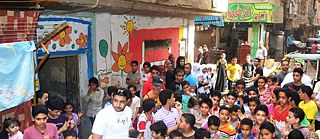Art for all in Cairo
Rich cultural life in a poor district

Ahmad Hassan wants to offer culture for all – that is why he opened a cultural center in a suburb of his hometown of Cairo, inspiring the locals with theater, film and photography.
A rickety van is the only type of public transportation between Cairo’s Shobra el-Kheima subway station and the stop in Ezbet Uthman (in the Qalyubia Governorate). This is where Ahmad Hassan’s El-Takeiba Center for Artistic and Cultural Development is located in the small, densely populated alley Haret el-Shawa.Ahmad Hassan sits at his desk at the cultural center, which is housed on the ground floor of a residential building. He is fervently planning theater performances, photography exhibitions and film screenings that will take place on this small side street. It all began in 2007, when Hassan worked as a ticket taker for a cultural center at Tahrir Square in downtown Cairo. One evening during a poetry event, he noticed a member of the cleaning crew, a man in his mid-sixties, observing the poets on the stage while cleaning the center. Hassan had a feeling that the man would have loved to recite a poem onstage himself. He was probably too nervous to express this wish, expecting that nobody would have been interested. This gave Hassan the idea to organize a cultural day following the slogan “Yallah, Shear” (Let’s do poetry!), giving people like this janitor the opportunity to share their poetry. He rented a theater and invited amateur poets from the surrounding area.
Culture for all
After a successful day of cultural work, Hassan met with friends in a café in downtown Cairo in order to make plans to offer “art for all.” The name of the café, El-Takeiba, inspired the official name of the future El-Takeiba Art Center in Ezbet Uthman.In 2011, Hassan founded the center in the small side alley Haret el-Shawa in the modest residential area of Shobra el-Kheima, where he also lived. “The area did not have much to offer in terms of cultural life. If I wanted to watch a movie, I had to go to downtown Cairo,” explains Hassan. “That is why I took it upon myself to create cultural life in my neighborhood.” His goal was to offer culture to people of disadvantaged backgrounds and help achieve a more equitable distribution of cultural offerings.
It was a huge undertaking for Hassan to get the cultural center established in Haret el-Shawa because some of the local residents considered art and culture to be an unnecessary luxury. Hassan also experienced some friction with religious fanatics who often have great influence in villages and slums.
Swap books instead of buying them
One of the cultural projects organized by the El-Takeiba Center for the residents of Ezbet Uthman is called “Rahhala” (Globetrotter). Hassan explains: “The main reason poorer people don’t spend their free time on entertainment and culture is the high cost. That is why they often don’t know historical sites, museums and theaters. We at Rahhala take locals on field trips to places that are inexpensive but completely new to them.”Another initiative is the book exchange: Books are often too expensive for the inhabitants of Shobra el-Khaima. This is why Hassan started a book swap initiative. The cultural center has a large library with a much larger selection than one could ever expect in a small alley. Everyone can exchange books for free. The project has already made stops in other parts of town, offering those residents the chance to also take advantage of the free book-share. Hassan says that this idea has even been implemented in other Arabic countries such as Tunisia.
Preventing violence against women
“Dell ragel wala dell heitah” (the shadow of a man is better than the shadow of a wall) is another of the center’s cultural projects. The name of the project is derived from an Egyptian proverb that is still used today in rural regions. It states that every woman needs a man in her life, even if he does not really take any responsibility.The goal of the project is to raise awareness for the different forms of violence against women that are rampant in the poorer communities. The project is part of the program “Haqqi” (my right) by the British Council in Cairo. Outside of the El-Takeiba Center, the alley walls are lined with pictures of plays and ballets that Hassan has brought from downtown Cairo to Ezbet Uthman and thus helped the locals claim their right to culture. It is quite a feat in light of the fact that until 2007, Hassan was just a lowly employee at a cultural center. And particularly when one considers that the alley is too narrow even for the rickety van that is their public transportation, meaning that visitors of the El-Takeiba Center can only get there on foot. Despite these obstacles, Hassan has managed to provide a wide range of cultural offerings for the residents of this underprivileged neighborhood.